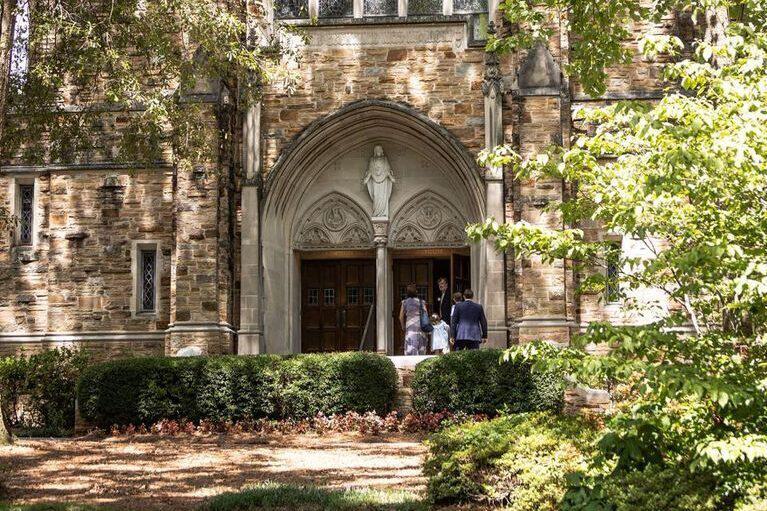Members of the administrative board of First United Methodist Church (FUMC) - Montgomery voted on Wednesday night to begin the discernment process to consider whether or not to leave the United Methodist Church (UMC) denomination.
The vote by the committee was 31-30 in favor of the discernment process. A 12-member subcommittee with 11 voting members established earlier in the year to investigate the issue recommended 6-5 to begin discernment.
By voting for the discernment process to begin, the administrative board opens up the discussiono to the church members. Members can then vote to leave the UMC or not.
A source said Wednesday night’s meeting was controversy-free and ran smoothly. About 250 members attended the meeting.
Members who voted against the discernment process stated the UMC was still their best option despite changes at large and that churches with similar memberships had voted to remain in the UMC.
Some of the concerns by members who voted for discernment were the progressive direction of UMC being inconsistent with their core religious beliefs, whether UMC would be financially viable in the future due to the number of churches voting for disaffiliation and the lack of time to consider alternatives to UMC without discernment.
According to its website, the First United Methodist Church of Montgomery (FUMCM) was founded in 1829, just a decade after Alabama’s incorporation into the union. The present-day chapel was constructed in 1933. The church made gradual improvements to its facilities over the next century.
Other congregations across Alabama have voted to disaffiliate from the UMC in recent months.
According to a Facebook page with 1,600 followers dedicated to promoting Auburn United Methodist Church’s (AUMC) withdrawal from the UMC, the Administrative Board stopped a vote on disaffiliation recently.
The page, AUMC Moving Forward, shared a resolution from AUMC’s Administrative Board on April 25. The resolution quoted Methodist reformer John Wesley’s statement “Do no harm” and argued that voting to disaffiliate will cause harm to the church. It resolved that AUMC “will remain firmly in the United Methodist Denomination and will discontinue all official discussion and considering of formal Discernment and Disaffiliation.”
According to the post, the Administrative Board at AUMC has 33 members and is not elected by the congregation.
“The Board first took a hand vote to accept the report from the Listening and Learning Task Force,” the post read. “This report showed results of a survey where 60.8% of members were in favor of Discernment. In addition, the Board received letters and e-mails over the last 3 weeks from members where over 57% asked the Board to allow AUMC to go into Discernment. So, the desire of the congregation for Discernment was taken away by 33 members of an unelected Administrative Board. This board that was hand chosen by a pastor sent to us by the UMC with a vested interest in remaining UMC for this very contrived outcome took your voice away and chose not to listen.”
According to AUMC’s website, the church’s real estate is worth almost $30 million. If AUMC would’ve left UMC, they would’ve been able to keep the church property by paying UMC $1,208,339.
Last week, nearly 150 congregations in north Alabama chose to disaffiliate with the UMC, just four days after almost 200 churches in the southern half of the state left the denomination. Combined with the 198 churches in the state that left the denomination in December, last week brought the state’s total to around 500 churches.
The waves of disaffiliation are part of an ongoing process for individual congregations to choose whether to remain a part of the UMC, become independent, or join other Methodist denominations.
The UMC began ordaining women in the mid-20th century, has supported federal gun control and was once a part of the pro-abortion Religious Coalition for Reproductive Choice (RCRC) before withdrawing in 2016.
It officially condemns homosexual activity and does not allow same-sex weddings or pastors who are "self-avowed, practicing homosexuals," but the issue of homosexuality is widely debated within the denomination.
These issues, underpinned by theological disagreements, eventually led traditional Methodists in the UMC to push for a process of separation that allowed churches to separate while retaining their church property.
Seceding churches can retain church property by paying a fee to the UMC, which helps pay for unfunded pension liabilities and two years of apportionments.
Churches that wish to leave the denomination and retain church property have until December to elect to disaffiliate.
To connect with the authors of this story or to comment, email caleb.taylor@1819News.com or will.blakely@1819news.com or find him on Twitter and Facebook.










